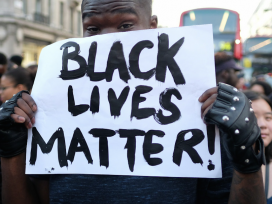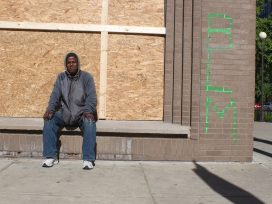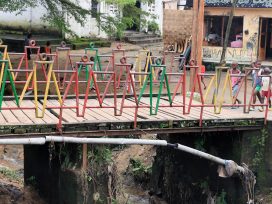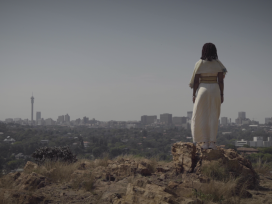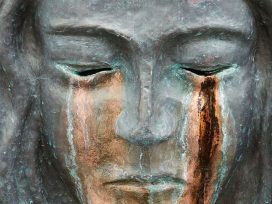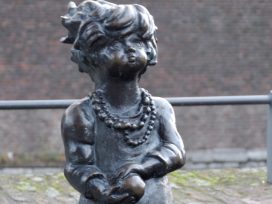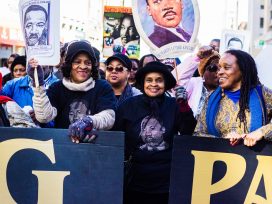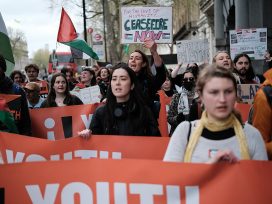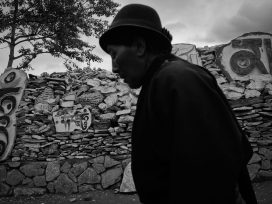2020 launched a new wave of racial reckoning worldwide. On the birthday of civil rights champion Martin Luther King, we offer reads on the roots of the Black Lives Matter movement, Black mental health, the legacy of 1968, and more.
To celebrate Martin Luther King day, we selected a set of reads which address the political advancement since the days of the late advocate of non-violent political resistance, and analyze how the Black Lives Matter movement took over the legacy of 1968 in the fight against systemic racism both in the US and in Europe.
The seeds of 1968
‘When a “seed” is planted by a political shock, its “harvest” may be either rich or poor. Much depends on the nature of the soil in which it is planted, on the climatic conditions during which it grows, and by its cultivation within the country’s institutions’.
1968, the year of Martin Luther King’s assassination, means different things to different people. Though there is a version of 1968 tied to the student and worker protests in France, Sidney Tarrow argues that it had a greater long-term impact in Italy and the United states.
The peculiarity of 1968 in the US, compared to other advanced capitalist countries, was the intertwining of class and race and the role of the Black Power movement.
‘One of the more meaningful examples of these class struggles […] was the Poor People’s Campaign launched by Martin Luther King and organizers in groups such as the National Welfare Rights Organization. The campaign demanded a shift in resources away from the US imperialist war in Vietnam and towards the abolition of poverty in the tradition of the “long civil rights movement”. […] A veteran of peace, freedom and labour struggles, King had come to the conclusion that overcoming Jim Crow racial regimes would require a direct confrontation with capitalism and imperialism’, says Jordan T. Camp in conversation with fellow leftist researchers Margit Mayer, Don Mitchell and Håkan Thörn.
‘The long historical struggles over the geographies of our lives’
A conversation about protest in the US, 1968-2018
At the roots of BLM
In spite of the political advancement made since the 1960s, systemic racism has survived even through the Obama presidency, which left many African Americans disappointed. The Black Lives Matter movement emerged in 2013 after the acquittal of the killer of Trayvon Martin in Florida, and ‘stresses the intersectionality of racial, sexual and gendered hegemonies’.
In this, the movement differs from earlier traditions of community organizing, and it is no coincidence that it ‘has experienced considerable friction with the more moderate organizations that succeeded the civil rights movements of the 1960s’. Nonetheless, Julien Talpin sees in building new coalitions between Black Lives Matter and older traditions of mobilization a promising way forward. Last year’s wave protests following the killing of George Floyd seem to prove him right.
Campaigns to remove monuments commemorating racism, slavery and empire are criticized for attempting to erase history. But anti-racists protesting the public prominence of these statues are challenging what history is remembered, in order to make way for a fresh lens on the past.
Due to the work of the Movement for Black Lives Matter, ‘people are able to connect the dots between the symptoms of the present crisis and their structural causes’.
At the peak of the demonstrations in June 2020, Deva Woodly reflects upon the creative power of protest and says the M4BL has changed common sense.
An American reckoning
The fire this time
Post-colonial Europe
Racism may be deadlier in the US, but Europe certainly isn’t immune to it. ‘Europeans outsourced most of their slavery to the colonies; what’s out of sight is easier to keep out of mind’. The same applies to the post World War II era, when the decolonization process was overshadowed by the pain of the Nazi occupation. Philosopher Susan Neiman on the scarcely acknowledged European colonial past.
In a rush to minimize the recession following COVID-19, some hold their economies dearer than the saving of lives. But prosperity isn’t the indefinite depletion of bodies and resources. It is through the satisfaction of basic needs that we will restore the dignity of all.
The weight of life
On the economy of human lives
Digitization is unifying the planet, but ‘this ubiquitous, instantaneous world […] is confronted by another world, the old world of bodies and distances, materials and areas, fractured spaces and borders – the world of separation’. In the Europe of camps, technology is mobilized in order to create an omnipresent border that sequesters those with rights from those without them.
Postcolonial theorist Achille Mbembe sees the border as the ‘noun we use to name the organized violence underlying contemporary capitalism and our world order in general’.
After moving from Johannesburg (Jo’burg) to Gothenburg (Go’burg), filmmaker Jyoti Mistry struck up a friendship with someone who went the other way: Katarina Hedrén, who was adopted by a white Swedish family, and moved to South Africa as an adult. This deeply personal take on race shows how ‘colour-blindness’ denies that racial prejudice exists but robs people of colour of words to talk about the discrimination they face.
Changing places
Notes for an essay film
Healing from trauma
Trauma may be inheritable, even genetically, recent scholarship suggests. Could the devastating impact of slavery and oppression explain why Black people are overrepresented in the psychiatric system?
The chains of the past
Black mental health in Britain
Violence against Roma is part of the European normality – this severe instance of racial violence is barely accounted for. It took over seven decades for Europe to acknowledge the genocide of Roma in WWII, and the communities still don’t have the means to heal among permanent attacks and persecution, with racist sentiment on the rise.
Roma communities never got a break
Roma Holocaust Memorial Day 2020
This article is part of our series of thematic reading lists. Check out our other Topicals here.
Published 29 January 2019
Original in English
First published by Eurozine
© Eurozine
PDF/PRINTNewsletter
Subscribe to know what’s worth thinking about.
Related Articles

Treasure trove or rubbish dump? In either case, oceans are being spoiled. Concepts from ‘mare liberum’ to ‘common heritage’ don’t safeguard the blue planet’s largest frontier from escalated seabed mining, industrialised fishing and waste disposal, nor global inequality and racialized violence. Could a democratic World Ocean Authority be the answer?

Protecting nature, empowering people
Environmental protests in the Balkans
The success of recent protests against extractivism and ecosystem degradation in Serbia and Albania highlights the potential for democratic reinvigoration around ecological issues in south east Europe. But the EU has yet to prove it can act as a credible partner in this process.


